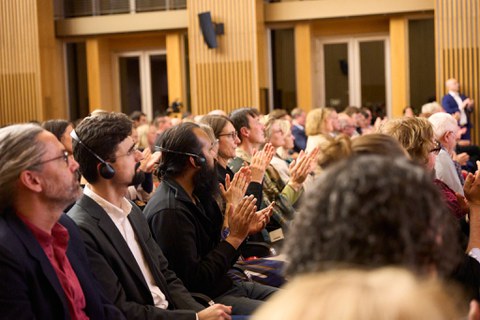Nov 07, 2024
TU Dresden celebrated United Nations Day and discussed "Prospects for Growth"
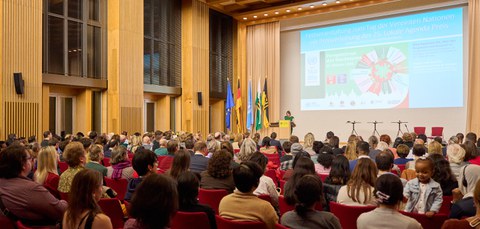
Plenary Room in the New Town Hall Dresden
On October 29, institutions, initiatives and interested citizens from Dresden's civil society gathered at the City Hall for UN Day 2024, which this year was held under the motto "Prospects for Growth". In times of economic bottlenecks, recession and inflation, many people around the world are asking themselves how sustainability aspects such as the circular economy, ecological diversity and social justice can be mapped and evaluated alongside the classic economic growth indicator gross domestic product (GDP) and what can be done at local level to bring together decent work and economic growth and thus promote the achievement of UN Sustainable Development Goal (SDG) 8 "Decent Work and Economic Growth" in conjunction with Goal 17 "Partnerships for the Goals".
To commemorate the founding of the United Nations on 24 October 1945, the Institute for Integrated Material Flow and Resource Management of the United Nations University Dresden (UNU-FLORES), the TUD Dresden University of Technology and the City of Dresden organize this annual festive event, at which, in the second part of the event, the Lokale Agenda 21 für Dresden e.V. awards the Lokale Agenda Award to exemplary projects and commitments to sustainable development in Dresden - for the 25th time in 2024.
Ceremony and award ceremony
Jan Pratzka, Deputy Mayor for Economic Affairs, Digital Affairs, Human Resources and Security of the State Capital Dresden, opened the ceremony with an international and local perspective on the topic. In his welcoming address, he emphasized the right of every person to fair and good working conditions, but noted that this right is not fulfilled everywhere. In order to promote the fulfillment of SDG 8 in a targeted manner, the Free State of Saxony has defined a model for shaping the world of work and made it part of the Saxony 2030 Skilled Workforce Strategy, among other things. Many of the municipal measures formulated for the City of Dresden in the integrated urban development concept INSEK for SDG 8, such as the Smart City project, the tourism strategy development with concrete reference to sustainability, the strategy for securing skilled workers, are running positively and others are being rethought, such as the Welcome Center. Finally, Mr. Pratzka congratulated the award winners and thanked them for their commitment.
UNU-FLORES Director Prof. Edeltraud Günther welcomed the audience and was very pleased that this year's UN Day theme was relatively close to her work as Professor of Business Administration, esp. Sustainability Management and Environmental Accounting. She gave the audience three ideas that could also be discussed alongside the debate on GDP as a classic growth indicator. These are environmental resources and the question of how these are changing, also in connection with the so-called planetary boundaries; wealth and the negative and positive effects of environmental events on wealth and growth; and the Beyond GDP initiative, which was the subject of the United NationsSummit of the Future and which suggests expanding GDP as a measure to include other aspects, i.e. using a broader benchmark for assessing growth.
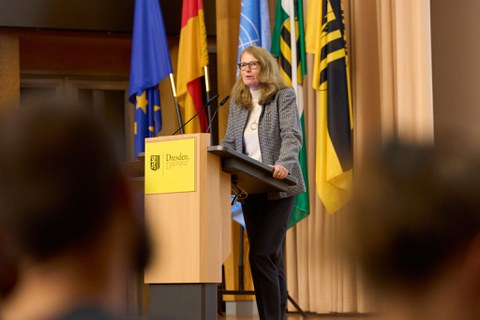
Prof. Edeltraud Günther
The panel discussion was opened by a video message from Prof. Dr mult. Dr h.c. Ulrike Malmendier, member of the German Council of Economic Experts. In her speech, the economist pointed out that growth, i.e. GDP, is not the only target figure for economists when evaluating an economy, but that a good growth policy is about maximizing the welfare of a society. Welfare means, for example, the health of a society and the well-being of future generations, which is influenced by a healthy environment, for example. She added that social status, i.e. the status one has in a society, also has an important influence on well-being. But if you want to increase welfare, e.g. through investments and advances in medicine and through green transformation, then this costs money. This year's Nobel Prize winners in economics Acemoglu, Johnson and Robinson have shown that an inclusive society with inclusive institutions also has a positive impact on the economic development of the entire population. Prof. Malmendier therefore argues that the two measures "growth/well-being" and "growth/degrowth" should be considered and used in harmony with each other and not against each other.
The impulses resulting from the previous contributions were taken up in the subsequent panel discussion with Prof. Christian Leßmann, Professor of Economics, esp. International Economics at the TUD Dresden University of Technology, Nina Treu, Co-Founder of Konzeptwerk Neue Ökonomie and Johannes Zieseniß, Scientific Advisor of Mission Wertvoll.
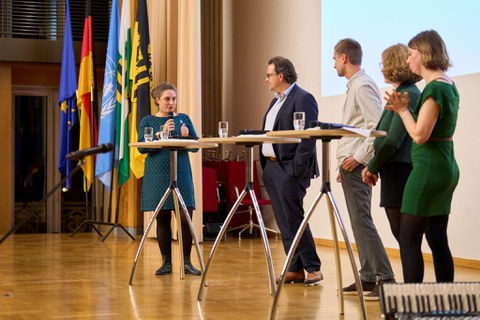
Panel Discussion
In her opening statement, Nina Treu called for creativity to seek solutions outside of our current (economic) system, capitalism, which is oriented towards profit and growth rather than people's needs and ecological/planetary limits. According to Treu, we will not find solutions to the existential crises mentioned by Joseph Stiglitz (environmental crisis, inequality crisis and democracy crises) within the existing system, as we are not looking at the causes of the crises that are anchored in the system itself.
Johannes Zieseniß also added the biodiversity crisis, which will have the same significance as the already mentioned crises. He emphasized that society will develop depending on the choice of metrics used, i.e. if we focus on materialistic metrics in measuring welfare, society will also become increasingly materialistic.
Prof. Leßmann emphasized that GDP as a metric does not measure welfare, but "only" the value of all goods and services in a society. If the four determinants of welfare, namely consumption including medical services, leisure time, inequality and life expectancy, are evaluated, as the Stiglitz Commission did in 2016, a measure of welfare results. However, when this is compared with the growth rate or GDP development, it becomes clear that this measure, the welfare measure, correlates very strongly with the traditional measures, i.e. these measures do not make a big difference statistically.
Nina Treu emphasized the need to focus the discussion on the question of how good the prevailing policy is and not to stop at GDP as a basis for evaluation. In her opinion, the state should be granted more rights within the framework of so-called regulatory policy so that hard ecological limits, such as CO2 taxes, can be set.
Prof. Leßmann suggested that the introduction of regulatory policy would be very difficult in a non-market economy system. He emphasized the importance of dialogue, such as at UN Day, of overcoming silo thinking and clarifying and defining the vocabulary used to overcome boundaries between different groups.
With the panel discussion and the impulses, UN Day 2024 helped to ensure that important issues relating to the topic of "Prospects for Growth" were also considered from a local perspective and reflected in an international context. The participants received many thought-provoking impulses that stimulated further discussions, also in private. However, it also became clear that there are multiple approaches to shedding new light on the measurability of growth and the metrics of welfare, but that these approaches also have their limits and that we are still a long way from a consensus on their use.
The UN Day celebrations also included the award ceremony for special contributions to sustainable development in Dresden, which is now in its 25th year and is organized by the Lokale Agenda für Dresden e.V. and the Lions Club Dresden Agenda 21. This year, four regional initiatives received the prestigious Lokale Agenda Award(prizes 1-3, prize 4).
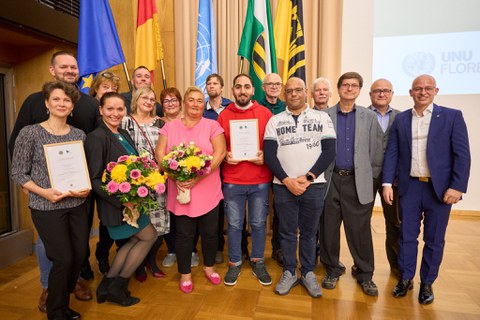
Winners of the Lokale Agenda Award
The musical accompaniment for the ceremony was provided by Alina Bauer and Nicolaas Cottenie, the duo Azind, who describe their sounds as a musical journey through Eastern Europe in search of individuality, exchange and connection. Artist Georg Weyerer was also on site with his installation SEMPER ALTIUS SEMPER PULCHRIUS SEMPER PLUS (Latin for always bigger always better always more) and answered visitors' questions in personal discussions.
The event was broadcast live on the YouTube channel of the City of of Dresden. A recording of the event is also available afterwards via the same link.
The United Nations in Dresden
79 years ago, on October 24, 1945, the Charter of the United Nations (UN) came into force. UN sites around the world are celebrating this event and the subsequent decades of commitment to world peace and more sustainable development. Dresden is also a UN site, as scientists from all over the world have been working here at the United Nations University Institute for Integrated Material Flow and Resource Management (UNU-FLORES) in the World Trade Center since 2012.
In addition to UNU-FLORES, the organizers of the United Nations Day in Dresden include the Lokale Agenda 21 für Dresden e. V., the City of Dresden, the TUD Dresden University of Technology and its Center for International Studies (ZIS), the UNICEF Working Group Dresden, the United Nations Association of Saxony, Saxony-Anhalt & Thuringia and the Lions Club Dresden Agenda 21 e. V..
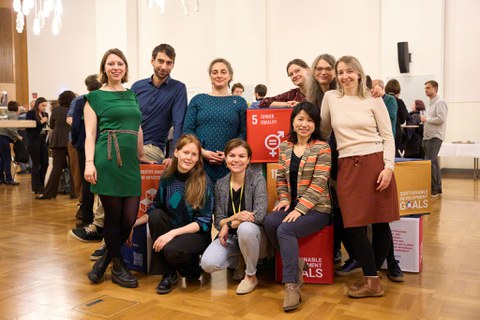
Organizing Team

